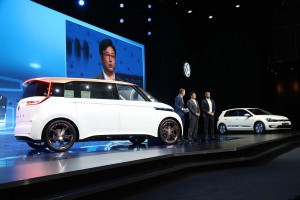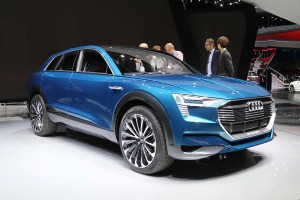
Volkswagen officials show off the maker's new battery electric minivan concept, BUDD-e, earlier this year.
Since the scandal surrounding its diesel engines broke, Volkswagen has been pushing its electrification program to the fore to show its commitment to green technologies. Skeptics wondered how serious the maker was.
Apparently giga-serious.
The company is contemplating building an $11 billion gigafactory of its own to churn out batteries for its electric vehicles, according to a report from Handlesblatt, a German publication.
The “multi-billion euro” factory is modeled on Tesla’s plant currently under construction in Nevada. Further details will likely be released after the company’s annual meeting June 22.
The factory would allow them to self-supply their batteries instead of buying them from suppliers, such as Panasonic, Samsung or LG Chem.
(VW electrifies Beijing with T-Prime Concept GTE. For more, Click Here.)
The plant, which will be located in Salzgitter, where the company now manufactures internal combustion engines, would allow the German automaker to meet its stated goal of selling 1 million electric cars – plug-in hybrids and battery electrics – by 2025.
As of now, VW has nine current or future battery-powered vehicles in its portfolio, including Audi and Porsche models: Volkswagen eUp, Volkswagen eGolf, Volkswagen Golf GTE, Volkswagen Passat GTE, Volkswagen Passat GTE Sportwagen, Audi A3 eTron, Audi Q7 eTron, Porsche Cayenne PHEV, and Porsche Panamera PHEV.
The firm also plans to introduce four new EV models: Porsche Mission E, Audi A6 eTron, Audi eTron Quattro and Volkswagen Tiguan GTE by 2019.
VW plans to have 20 new battery-based models in its portfolio by 2020. It already has several on sale around the world, including fully electric versions of both the Golf and the smaller Up! In recent months, it has been offering hints of what else might be coming with concept vehicles like the Volkswagen T-Prime GTE that debuted this week at the Beijing Auto Show.
(Click Here for details about the $18.2 billion hit VW is taking for its diesel deception.)
Of course, building the plant may only solve half the problem. Tesla has noted that in order to produce the 500,000 vehicles it forecasts, it will need all of the world’s available lithium-ion production capacity.
Some industry observers have wondered if VW would be able to fund such a plant, but as reported earlier, the German maker is still profitable. The maker’s $2.6 billion profit for the January-March quarter was down 20.1% from year earlier numbers. Excluding one-time items, VW’s operating profit was down 5.9%, to $3.5 billion. Sales and other revenues, meanwhile, slipped 3.4%, to $56.8 billion.
The profits come even as the automaker agreed to spend about 7.8 billion euros, or $8.8 billion, to buy back or fix the diesel cars it had rigged as part of an emissions testing scam.
Ultimately, analysts have estimated the maker could spend anywhere from $23 billion to $46 billion to settle the matter. VW may, in turn, have to sell off some assets to cover those costs.
(To see more about Volkswagen being back in the black, Click Here.)
The decision to take an $18.2 billion hit to 2015 earnings meant VW had a $4.65 billion operating loss last year, the biggest in its history. That is forcing the maker to enact cost reductions across an empire that includes 13 separate brands.

